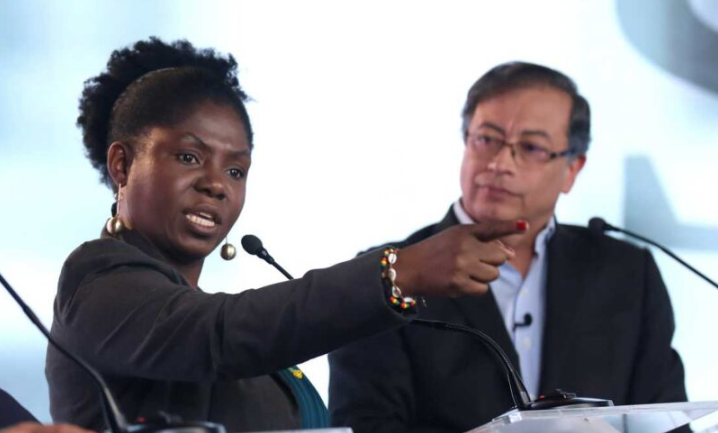Colombia has been one of the countries with the most conservative traditions in the continent. Since the formation of single-color majorities, both of the Conservative Party (1886-1930) and the Liberal Party (1930-1945), Colombia’s weak democracy has been built on a two-party system that, de facto, and also de jure, has cut off any political expression coming from the left, especially since the configuration of the National Front in 1958.
The electoral competition of progressive parties began precisely in 1972. In that year, legislative elections took place in which different expressions such as the Independent and Revolutionary Workers’ Movement (MOIR), the Colombian Popular Front or the Colombian Communist Party – created in 1930 – obtained almost 800,000 votes. However, the successive elections left different attempts of adhesion, with their subsequent rupture, which caused the left to move without any political relevance.
It was not until the beginning of the 1990s, and specifically with the approval of the 1991 Constitution, that the left had some sort of protagonism. Since in many occasions, due to the armed conflict, the left was reduced to the insurrectionary connotation championed by the guerrillas. Thus, the ADM-19, heir to the recently demobilized M-19 guerrilla, obtained a decent third place in the 1990 elections, with just over 10% of the votes in favor of its candidate, Antonio Navarro Wolff.
Since then, the expectations of a progressive turn, spurred by the demobilization of several guerrilla groups or the change brought about by the advanced constitutional order of 1991, came up against reality. The overcoming of the extemporaneous Constitution of 1886, while recognizing immeasurable possibilities for the transformation and modernization of a precarious social State such as the case of the Colombian one, consolidated a neoliberal and open trade model like few others in the continent. So much so that few things did more damage to the newly born Constitution of 1991 than the “Washington Consensus” of 1989.
Conflict-related violence also did its part to undermine the possibilities of any trace of progressivism in Colombia. First, in the 1980s, it stirred up a political genocide of the militancy and leadership of the Patriotic Union party. A formation that emerged in 1985 after the La Uribe Agreement with the FARC-EP, and which was to make possible a transition to democratic life for part of the left that aspired to the dream of social revolution.
Paramilitarism, in collusion with State agents and members of the security forces, perpetrated a directed and systematized political violence that resulted in thousands of deaths, including that of presidential candidates such as Jaime Pardo Leal and Bernardo Jaramillo, and others such as Carlos Pizarro Leongómez (commander of the M-19 and first leader of his political party).
Apart from what was aforementioned, since 1993 – under the acronym ACCU (United Self-Defense Forces of Córdoba y Urabá – and since 1997 as United Self-Defense Forces of Colombia (AUC), paramilitary forces have reached its highest levels of violence against society. Social activists, community leaders, and trade unionists were subjected to excessive violence, resulting in hundreds of massacres and thousands of deaths.
Any of these groups mentioned were synonymous with guerrilla sympathizers and, therefore, for paramilitary forces, they simply had to be eliminated. Similarly, the FARC-EP or the ELN, with their crimes and actions against the citizenry, and their involvement in drug trafficking during the 1990s, ended up being denaturalized. They lost any hint of sympathy for the most vulnerable sectors of a country that, as if that were not enough, found in the guerrillas an additional problem, not trivial at all, to a life of scarcity and lack of opportunities.
This panorama was compounded by a deeply corrupt political system at the service of traditional elites who have tended to appropriate the State and weave all kinds of favoring relationships. Where the democratic left could not but have serious difficulties to run in the elections with a minimum chance of success. The same happened with other additional factors such as the proximity to the U.S. geopolitical code: the militarization of the public space produced by heavy-handed security policies ― as happened during the presidencies of Álvaro Uribe (2002-2010) ― and a strongly parochial and hostile political culture, especially in rural areas.
While all this has been juxtaposed over the decades, the democratic left has been involved in internal disputes and circumstantial alliances later blurred by personalism and ideological disagreements. Likewise, social mobilization has tended to function more like a burst of rage. On many occasions, without orientation, because for many decades, and unfortunately for the democratic left, the guerrilla claimed the role of the only interlocutor capable of raising the banner of social transformation through its confrontation with the State.
However, the same factors that for a long time have hindered the left electoral competition are now pushing in favor of political change. The signing of the Peace agreement has freed a space for the left by blurring the war/peace axis that for so long dominated Colombian electoral competition. This blurring – which does not imply that armed violence does not continue to be a problem to be solved – makes visible, problematizes and politicizes aspects, problems and social issues such as housing, education, health, and employment, that give a new meaning to the left programmatic proposal.
Besides, although still far from a relative structuring capacity, the social mobilizations of 2019 and 2021 against the government of Iván Duque also show a change of repertoire in the mechanisms of protest and political claim used by citizens. It is a claim that, does not accept anymore the preconceived idea by part of the country’s elites in which democracy is something devoid of conflict and as a strict concession of rights. The social conflict, the capacity of democracy as an institutionalization of such conflict, and the understanding of rights as a conquest are a novel part that Colombian citizenry must discover.
Finally, it cannot be ignored that the dominant neoliberal model over a constitutional order that offers many possibilities finds in it an ideal scenario to produce and give birth to a multitude of contradictions and tensions still remaining to be resolved. Thus, the left has found in Gustavo Petro, a former member of the M-19 guerrilla, as well as a renowned senator and former mayor of Bogotá, the emblematic leader it needed.
Gustavo Petro is a candidate who has managed to bring together almost all left-wing formations, movements and platforms. Already in 2018 he obtained the best result in history by the democratic left in Colombia, taking the electoral dispute on the left/right axes. Now, four years later, and leading the National Historical Pact, it has been the most voted force in the Senate and the second most voted in the House of Representatives. In addition, the internal consultation that should spur Petro as the candidate of the formation, and in which the name of its vice-president, Francia Márquez – a black woman, lawyer, activist and victim of violence – has burst in, have been accompanied by very high levels of participation. These elements allow affirming that both are facing the historic opportunity to lead Colombia to the first left-wing government in its history. Hopefully nothing will prevent it.
Translated from Spanish by Janaína Ruviaro da Silva












